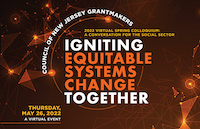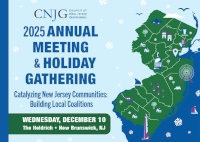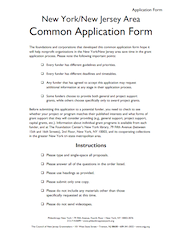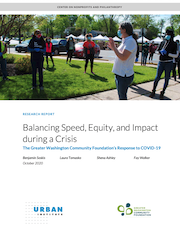Site Search
- resource provided by the Forum Network Knowledgebase.
Search Tip: Search with " " to find exact matches.
Igniting Equitable Systems Change Together

Date: Thursday, May 26
Time: 1:00 to 5:00 p.m.
On May 26, the Council brought together recognized thought leaders from philanthropy and nonprofits for a conversation exploring how the social sector can advance systems change.
Grantmakers and nonprofits grapple with complex, structural issues every day, and take on the difficult questions to move our collective work forward.
During a dynamic discussion, panelists shared strategies to empower proximate leaders, remove structural barriers and build the capacity of grassroots organizations, and shift mental models to challenge assumptions and strengthen nonprofit-funder relationships. After the panel, case study presenters highlighted three local examples of systems change, emphasizing the importance of cross-sector collaboration, collective action, and community engagement. Then, attendees gathered together for small group discussions to unpack key takeaways and discuss their own successes and challenges with systems change.
One of the most highly regarded convenings for social sector leaders in the state, the 2022 Virtual Spring Colloquium considered the power and cultural shifts needed to advance systems change through philanthropic and nonprofit partnership.
Attendees can revisit Whova to access event features such as session recordings, exhibitor virtual booths and sponsor pages, NJ Poetry Out Loud performances, and more.
| Agenda | |
| 1:00 - 1:30 pm: | Opening Session Featuring Sponsors & Exhibitors |
| 1:30 - 2:00 pm: | Break & Independently Visit with Sponsors & Exhibitor Virtual Booths |
| 2:00 - 3:30 pm: | Panel Discussion & Case Study Presentations - Igniting Equitable Systems Change Together |
| 3:30 - 4:00 pm: | Small Group Discussions |
| 4:00 - 4:15 pm: | Break & Independently Visit with Sponsors & Exhibitor Virtual Booths |
| 4:15 - 5:00 pm: | Networking Reception Featuring NJ Trivia |
 Catalyzing New Jersey Communities: Building Local Coalitions
Catalyzing New Jersey Communities: Building Local Coalitions
Wednesday, December 10, 2025 - 10:00 am to 3:00 pm
Location: The Heldrich Hotel & Conference Center
10 Livingston Avenue, New Brunswick, NJ 08901
Join over 125 of your fellow CJNG members and special guests for a day to celebrate the end of the calendar year, connect with colleagues, and explore this year's theme: Catalyzing New Jersey Communities: Building Local Coalitions. We will celebrate our collective impact, share stories of success, learn from one another’s experiences, and collectively envision a more connected, resilient, and equitable future for New Jersey. The Annual Meeting & Holiday Gathering includes a panel discussion that will explore the profound and tangible ways that philanthropy can move beyond traditional grantmaking to become powerful coalition builders for lasting change.
During the luncheon, we will convene our annual business meeting to elect new trustees, recognize new CNJG members, and report on our activities for the year. There will be time to connect and collaborate with colleagues and friends, old and new.
The day kicks off with a New Member Orientation for any new CNJG members or new staff of existing members to learn more about CNJG’s many offerings. Separate registration is required.
Prior to the Annual Meeting, CNJG will offer a deeper dive into the Impala platform that will launch in New Jersey for all grantmakers and all nonprofits. During this workshop, we will showcase the Impala for Grantmakers product which can help you:
- Conduct due diligence for potential and returning grantees
- Find nonprofits that you might not yet know
- Find who else is funding in a particular geographic or topical area
- Find which nonprofits are working in a particular geographic or topical area
- Find connections to other funders
- Communicate to potential applicants what your funding criteria is
| Agenda | |
| 9:00 am – 12:00 noon | Registration, Networking, Continental Breakfast and Coffee |
| 10:00 am – 11:30 am | Workshop |
| 12:00 noon – 12:45 pm | CNJG Annual Meeting of Members |
| 12:45 pm – 1:30 pm | Lunch and Networking |
| 1:30 pm - 2:20 pm | Panel followed by Q & A |
| 2:20 pm – 2:35 pm | Meeting adjourns |
| 2:35 pm – 3:00 pm | Networking |
The rising cost of housing, a limitation on supply of affordable housing stock, and economic shocks and disruptions have led to an increase in homelessness across the United States. Over this time period, the City of Newark has made strides in fostering collaborative and innovative approaches to housing the unhoused. In December, the City released a strategic plan to end chronic homelessness, the first plan of its kind in some time. Specifically, its vision states that “Newark will strive to end chronic homelessness for all individuals over the next three years through collaboration, prevention, and housing.” The vision goes on to state that when it [homelessness] cannot be prevented, it will be a rare, brief, and nonrecurring experience.”
We hope that you will join us as we hear from leaders of this collaborative effort as they discuss how they are working toward their shared vision.
Panelists:
Luis Ulerio, Newark Homelessness Czar, Director of the Mayor’s Office of Homeless Services
Jim Pelliccio, Chair of the City of Newark Commission on the Homeless and President and CEO of Port Newark
Evan Weiss, President and CEO, Newark Alliance
Cost: Free for CNJG Members; $50 for Non Member Grantmakers.
Despite a field replete with research, analysis, recommended policies and practices — not to mention an abundance of educational programs and frameworks for grantmaking to diverse communities — philanthropic leaders have been slow to advance these values in their foundations. Philanthropy Northwest (PNW) wondered: what is getting in the way? Why are good intentions, buttressed with theory and practical advice, not achieving better results on measures of diversity, equity and inclusion?
With the support of the D5 Coalition, PNW began a year-long study to explore these questions. The study was divided into two parts. They began with personal interviews of 23 philanthropic leaders in the Pacific Northwest. In order to better understand how these organizations incorporated diversity, equity, and inclusion into their work and workplaces, they collected baseline information about their staff composition, leadership styles, and organizational practices/policies.
This report details their findings. It includes an in-depth look at the peer cohort model, in which ten foundation leaders met regularly to discuss these issues and support each other in advancing their own leadership. It also includes practical lessons about shifting organizational cultures towards greater diversity, equity and inclusion — lessons drawn directly from the experiences of peer cohort leaders.
PNW presented this work in a webinar hosted by the D5 Coalition. The webinar recording and slides are below.
Tax Exempt Organization Search helps users find information about a tax-exempt organization’s federal tax status and filings. You can find:
- Organizations eligible to receive tax-deductible charitable contributions (Pub 78 data).
- Automatically revoked organizations
- IRS determination letters dated on or after January 1, 2014
- Form 990-series returns
- Organizations that have filed a Form 990-N (e-Postcard)
Nonprofits can and should play an active role during elections, particularly by educating and activating voters. However, with important local, state and federal elections coming up this fall, nonprofits should take the time to remind their staff about appropriate activity during a political campaign or at any other time. This overview developed by Donors Forum provides important tips and examples of activities that are permissible for nonprofits during an election cycle.
A corporate member queried the corporate listserve which technology tools they use for their corporate giving system/platform. CNJG compiled the responses and combined it with previous responses from other technology systems queries to create this list of “Who Uses What Technology Systems.” If your organization is not listed, please email the names of those systems to Craig Weinrich.
The Health and Environmental Funders Network (HEFN) and Sustainable Agriculture and Food Systems Funders (SAFSF) invite you to join an informal conversation to learn from funder peers who are practicing participatory grantmaking (PG). We’ll begin with a brief overview of PG, and how this practice can be used to center equity and justice as we shift away from extractive grantmaking practices. We’ll then hear from a few HEFN and SAFSF members who are implementing different models of PG in their grantmaking.
If you’re new to the concept of participatory grantmaking, this webinar is a great opportunity to see examples of it in action. If you’re familiar with participatory grantmaking (or working to implement these practices in your own world), this is a chance to dive deeper into others’ practices for learnings and insight. Time will be reserved in the agenda for discussions in smaller groups and, as you might expect, the call will be participatory!
Speakers:
Amanda Tello, St. Louis Environmental Justice Fund
Shavaun Evans, Food and Farm Communications Fund
Mark Muller, Regenerative Agriculture Foundation
Resources
Zoom Recording
Webinar slides
Deciding Together Shifting Power and Resources Through Participatory Grantmaking
Amanda Tello’s communal agreements
PG Learning Community Summary

What are the biggest needs and challenges New Jersey communities face as result of the pandemic?
- It starts with the basics: food and shelter, medical equipment such as masks for long-term care facilities, and digital access for remote education and medical screenings. For many immigrants and the undocumented community, this challenge is even greater.
- Parents of school-age children need support in navigating remote education and childcare challenges -- and balancing them with employment needs.
- People who’ve lost their jobs need to know how to find the right support services, and those services need to be accessible -- no technology or language barriers.
- Schools are having to re-imagine how they can open in the fall – if they can – with appropriate social distancing that requires changes to infrastructure and schedules.
- Organizations need support to retrofit their public spaces so they can serve the public safely.
How is CNJG leading efforts to prepare the philanthropic sector for an effective response?
- CNJG helped create the Disaster Philanthropy Playbook after Superstorm Sandy in 2012 and uses many of the lessons learned then to inform response and recovery plans for COVID.
- Almost immediately, CNJG began providing funder briefings, webinars, and other forms of information to the philanthropic community.
- With our members, CNJG created the COVID-19 Funder Learning Community for the numerous response funds that are serving New Jersey was established to:
- Get timely updates on the latest pandemic developments
- Share information about what services and help are needed most -- and where
- Explore potential strategies for effective grantmaking that matches resources to needs and avoids duplication
- Learn best practices from each other
How is the pandemic affecting New Jersey nonprofits?
- The COVID-19 crisis is having a significant and alarming financial and programmatic impact on the nonprofits relied on to care for those in need. According to the Center for Non-Profits Rapid Response Survey:
- 83% cancelled programs or events and correspondingly lost revenue
- 77% have budgetary implications related to strains on the economy
- 52% have increased demands for services
- 40% experienced a disruption in supplies or services provided by partners
- 37% have an increase in or sustained absences of staff and volunteers
- 31% have had layoffs or furloughs
- Many nonprofits lack the digital infrastructure needed to employees’ and volunteers’ sudden switch to remote work and many volunteers who do important work are no longer available.
How is New Jersey’s philanthropic sector responding to the needs of nonprofits and the people they serve?
- Many funders have streamlined the grantmaking process so nonprofits can either refocus grants or receive new funding expeditiously to provide immediate relief for those facing the most pressing situations.
- Many funders are reducing what they ask of nonprofit partners – for instance postponing reporting requirements, deferring site visits, and eliminating other demands on their time so they can focus efforts during this challenging time.
- Some are providing low- or no-interest loans or outright grants to small businesses and nonprofits to retrofit their facilities to keep essential workers and the people they serve safe.
- Several community foundations and other nonprofits have established NJ COVID-19 relief funds that make it safe and convenient for donors to give, and that direct resources to where they are needed most.
- The sector is committed to grounding its work in the Center for Disaster Philanthropy's key principles of grantmaking:
- Resilience, to improve communities holistically and make them stronger than before a disaster.
- Equity, to take historical injustices into account and inform investments.
- Sustainability, to take into account a long-term view and factor in uncertainty.
- Civic participation that equips and empowers those often left out to influence what happens in their communities.
How is CNJG responding to longstanding equity issues that the pandemic exposes and makes worse?
- Together with the Center for Non-profits in New Jersey, we put out a statement on behalf of the state’s philanthropic and nonprofit sectors, urging everyone to speak out against racism and discrimination in all forms.
- CNJG established a Racial Equity Task Force to eliminate any structural racism in New Jersey’s philanthropic community.
- Most of the larger COVID funds engaged community-based practitioners to assist in decision-making on grant awards, and CNJG is creating a local advisory group for the Learning Community.
What steps are being taken to make sure grants aren’t duplicative and that money is going where it’s needed most?
- CNJG encourages the philanthropic sector to use a shared mapping tool that shows how much money is being awarded and where. This tool helps grantmakers make informed decisions and helps to eliminate gaps in historically under-funded communities.
- The COVID-19 Funder Learning Community is a vehicle for building relationships and sharing information about what each funds is doing to support relief and recovery across the state.
What’s the best way for people to donate money for relief and recovery?
You can find a list of these New Jersey Relief and Recovery funds and their contact info here.
A key objective of the Scaling What Works initiative has been to translate insight and learning from grantmaker intermediaries involved with the Social Innovation Fund and share them with the broader philanthropic community. The fifth guide in the Lessons Learned series presents the benefits and challenges of partnerships between local and national funders, and highlights key considerations for both kinds of funders to foster success in their collaboration.

The COVID-19 public health and economic crisis has changed our world as we know it. As employers moved to remote work, schools shifted to distance learning, and businesses closed completely, it became clear that the impact on residents, nonprofits, and businesses was far greater than anyone could have ever imagined.
In response to the growing and evolving needs of our region, the Greater Washington Community Foundation established the COVID-19 Emergency Response Fund to raise and rapidly deploy funding to local nonprofits providing food, shelter, educational supports, and other critical services.
From the beginning our goal was clear: to address the immediate needs and reach adversely affected communities, particularly low-income households and communities of color. We know all too well that in a crisis like this, these marginalized communities are hit the hardest, and often take the longest to recover.
In times of crises, The Community Foundation is our region’s philanthropic first responder, bringing together individuals and families, philanthropic peers, corporate partners, and local government advisors to address community issues. Building on our rich history of emergency response work, we grounded our COVID-19 response efforts in a similar coordinated approach.
This report chronicles the steps taken, under immense pressure, to develop a coordinated emergency response effort to support a broad range of needs across the region. Once again this effort has demonstrated that working in partnership and close collaboration with our philanthropic peers and local government advisors is an effective way to manage a response to both urgent and longer-term needs.
